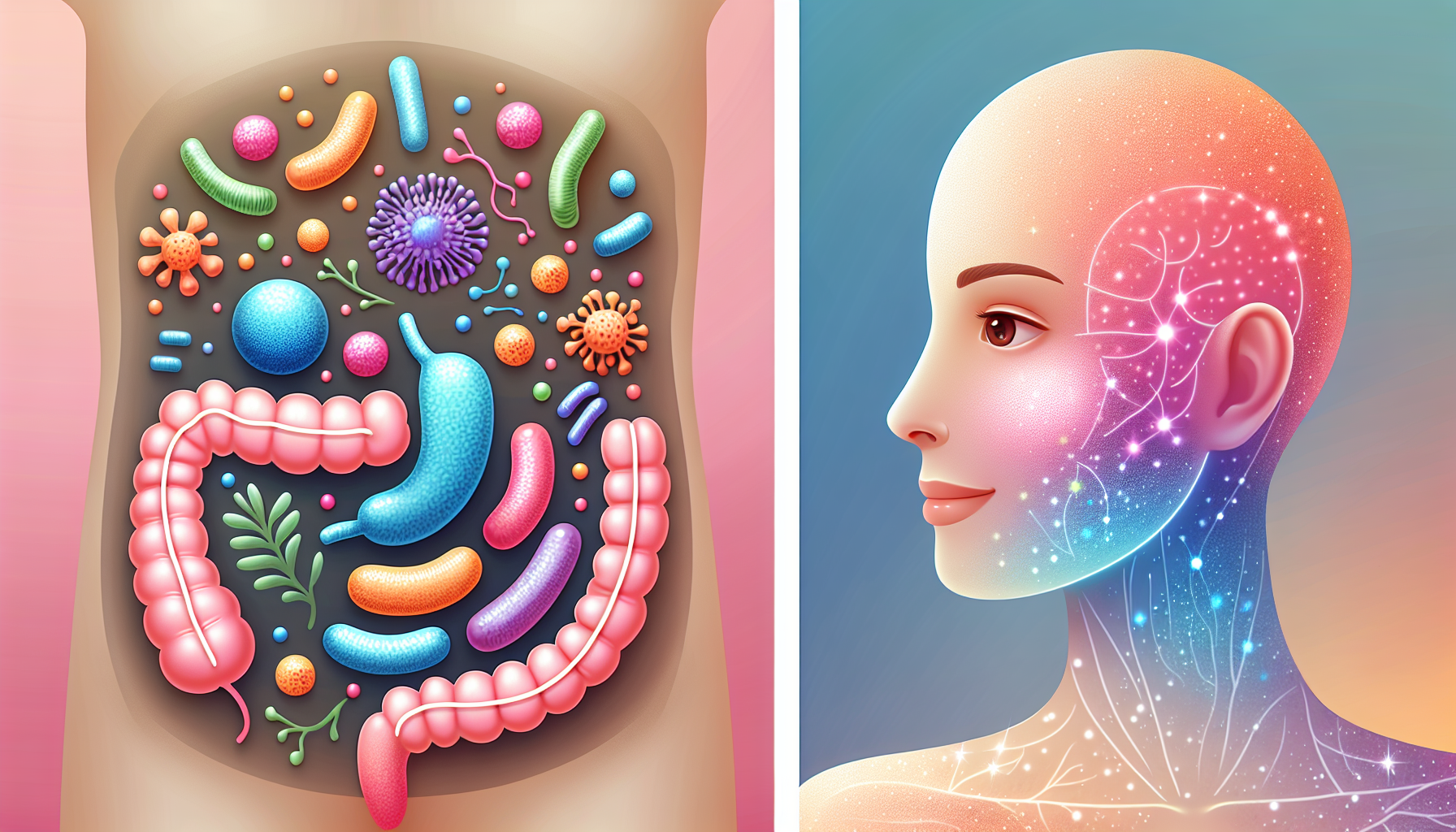The intricate relationship between our gut health and skin problems is a fascinating intersection of two seemingly disparate fields: gastroenterology and dermatology. As the largest organ of the human body, the skin often reflects the internal dynamics of our health, and emerging evidence suggests that the gut microbiome plays a pivotal role in maintaining skin health. This article aims to unravel the complex dialogue between our digestive system and skin, shedding light on how gut health can influence skin conditions, and what steps can be taken to foster a harmonious balance for overall well-being.
The Gut-Skin Axis: An Overview
The gut-skin axis refers to the bidirectional communication between the gastrointestinal tract and the skin. This relationship is mediated by a variety of factors, including microbial populations, immune responses, and metabolic pathways. The gut microbiome, consisting of trillions of bacteria, viruses, and fungi, is central to this axis. It not only aids in digestion but also modulates the body’s immune system and produces key substances that can influence skin health.
Alterations in the gut microbiota can lead to dysbiosis, a state of microbial imbalance, which has been associated with several skin conditions such as acne, eczema, psoriasis, and rosacea. Recognizing the signs of gut health issues and understanding their potential impact on the skin is essential for developing effective management strategies.
Dysbiosis and Skin Inflammation
Dysbiosis can trigger systemic inflammation, which may manifest on the skin in various forms. For example, the presence of certain pathogenic bacteria in the gut can lead to the release of pro-inflammatory cytokines that travel through the bloodstream and can exacerbate inflammatory skin conditions. A balanced gut microbiome, therefore, is crucial in managing skin inflammation.
To explore this concept further, consider the relationship between dietary choices and skin health. Foods high in sugar and fat can negatively affect the gut microbiota, leading to an increase in inflammation that may worsen skin conditions. For a deeper understanding of how diet influences skin inflammation, read about The Impact of Dietary Choices on Skin Inflammation.
The Role of the Gut Microbiome in Skin Barrier Function
The skin barrier is the body’s first line of defense against environmental aggressors. A healthy gut microbiome supports the integrity of this barrier by influencing the production of skin-protective oils and the skin’s pH balance. When the gut microbiome is compromised, it can lead to a weakened skin barrier, making the skin more susceptible to irritants and pathogens.
Research has shown that certain probiotics, which are beneficial bacteria, can strengthen the skin barrier and enhance its protective functions. For individuals seeking to maintain a robust skin barrier, it is worth exploring Top Ingredients to Look for in Hydrating Skin Care Products.
The Importance of a Diverse Gut Microbiome
A diverse gut microbiome is associated with a healthier immune response and reduced skin issues. Diversity ensures a balance of beneficial and commensal bacteria, which can outcompete potential pathogens and regulate the immune system to prevent overactive responses that might lead to skin problems.
To promote gut microbiome diversity, a diet rich in fiber, fermented foods, and a variety of plant-based foods is recommended. Additionally, reducing the use of unnecessary antibiotics, which can deplete beneficial bacteria, is crucial for maintaining a diverse and resilient gut microbiome.
For more information on the importance of maintaining a diverse and balanced gut microbiome, consider reading about Digestive Health as it plays a central role in overall wellness, including skin health.
Probiotics and Prebiotics: Allies of Skin Health
Probiotics and prebiotics are integral to nurturing the gut-skin connection. Probiotics introduce beneficial bacteria to the gut, while prebiotics provide the necessary nutrients to foster the growth of these helpful microbes. Together, they can help restore balance to the gut microbiome, which in turn may alleviate some skin conditions.
A plethora of clinical studies have identified specific strains of probiotics that can benefit skin health by reducing inflammation, enhancing the skin barrier, and even offering protection against UV-induced damage. Prebiotic fibers, found in foods like garlic, onions, and bananas, also support the growth of these beneficial bacteria.
For those interested in incorporating these into their skincare routine, understanding the Benefits of Honey in Natural Skin Care Routines can provide insights into natural prebiotic and antimicrobial treatments for the skin.
Addressing Gut Health to Improve Skin Conditions
Managing gut health to improve skin conditions involves a multifaceted approach that includes diet, lifestyle, and possibly supplementation. A diet rich in whole foods, lean proteins, healthy fats, and a colorful array of fruits and vegetables can provide the nutrients necessary for a healthy gut microbiome. Additionally, lifestyle factors such as adequate sleep, stress management, and regular exercise contribute to gut health and, by extension, skin health.
For individuals dealing with chronic skin conditions, consulting with a healthcare provider might be necessary to address any underlying gut-related issues. This may include comprehensive stool testing, food sensitivity testing, or exploring the use of probiotics and prebiotics under professional guidance.
External Resources for Further Exploration
To deepen your understanding of the gut-skin connection, here are some highly specialized resources:
- Gut Microbiome’s Influence on Skin Health – This resource provides a detailed overview of the scientific research connecting gut microbiota to various skin diseases.
- Probiotics and Skin Health – This journal article delves into the potential of probiotics as a therapeutic intervention for skin disorders.
- The Role of Diet in Dermatology – A comprehensive review that discusses the impact of dietary patterns on skin health and disease.
- Prebiotics and Skin Health – An exploration of how prebiotics may contribute to the maintenance and improvement of skin health.
- Stress, Gut Health, and Skin – This article examines the role of psychological stress in gut health and subsequent skin conditions.
By embracing the connection between gut health and skin problems, we can adopt a more holistic approach to skincare that goes beyond topical treatments. Understanding the gut-skin axis allows for a deeper comprehension of the root causes of skin issues and paves the way for more effective and sustainable solutions. Through diet, lifestyle adjustments, and the strategic use of probiotics and prebiotics, we can nurture our gut microbiome and, in turn, promote healthier, more resilient skin.



